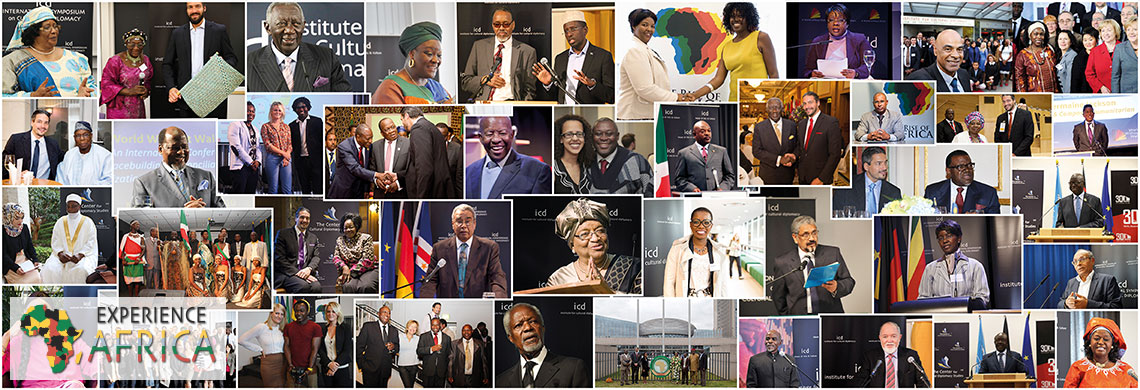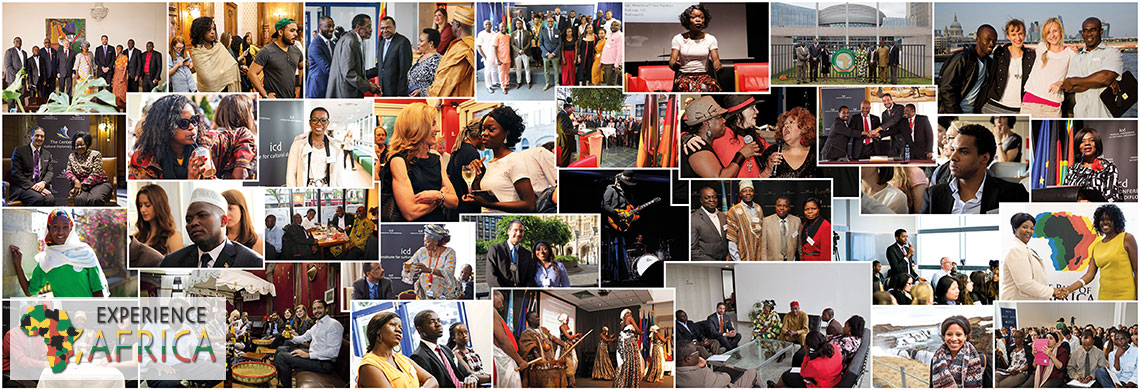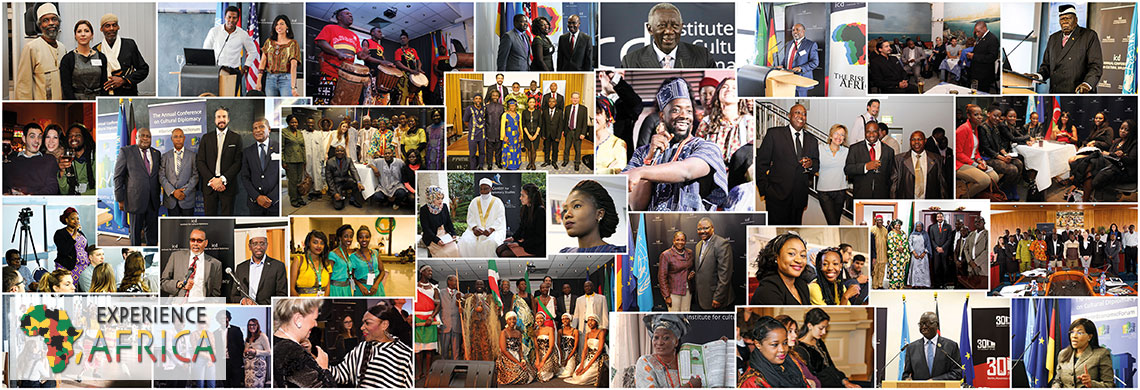The Power of Africa
"Africa as a Stronger Actor on the International Stage"
(Paris, May 2nd - 4th, 2012)


During the conference the French presidential elections and their implications on the EU-African relations and on the French-African relations will be addressed and analyzed in depth.

Conference Agenda
This third Africa related conference that is being hosted in the spring of 2012 will focus on the possibilities and barriers that the African countries are facing in terms of economic and political bargaining power as well as the prospects of speaking with one voice on the international stage.The conference will in particular address the expectations and opinions that the outside world holds of African development and how this often diverges with what might be more realistic and customized solutions on the ground. One aim of the conference is thus to debate whether alternative forms of institutional rule and economic models can be deemed more effective in Africa than the established forms of Western governance. The conference will look at global as well as local perceptions of African leadership and development, and the bilateral trade relationships that Africa has with China and India. Furthermore we will explore the role of the African Union as well as civil societies in enhancing interregional relations within Africa and what prospects this holds for its future international image and bargaining power.
The following issues will be addressed:
The Global Perceptions of Africa: Past, Present and Future
This subtheme of the conference aims to highlight how the narrative of ‘Africa’ is still being used as an umbrella term in which to encapsulate the diverging problems that the individual African countries are facing. This section will look at whether there has in fact been a transition from the historical account of Africa to a more informed appreciation of the individual countries and their specific characteristics. It will address how the media have been and are still contributing to depict a certain image of ‘Africa’, and whether there might be situations where talking about Africa as one unit also carries some benefits. Present perceptions of African leadership and western standards in dealing with African leaders will furthermore be discussed in order to uncover a political transformation as well as exposing the concurrent presence of the past.- Changes in the Discourse of Africa
(Focus: Western attitudes towards Africa; historical accounts; change of paradigm ; the colonial era; religious institutions) - The Narrative of "Africa": Views on Africa and their Implications
(Focus: The role of media; the construction of stereotypes; impacts on investments; Africa as one entity) - Global Perceptions of African Leadership
(Focus: Forging new relationships; double standards; the Mo Ibrahim Prize; rogue states; types of leadership) - Nation states, their origins and their limits
(Focus: Micro- vs. Macro successes; representation and fragmentation of ethnic groups; state borders; presence of the past)
A Stronger Africa: Responses, Expectations and Realities
Africa has over the past decades no doubt gained more leverage as a significant power to be reckoned with. Discrepancies nevertheless exist between what is being expected from African development and what might be a better solution to the specific national conditions. This section seeks to create an interesting debate around the need for African countries to develop a sense of ownership around what their individual countries see as the most efficient forms of leadership and economic governance - a form of ownership that should be outside the realm of external expectations and influence. Further topics that will be explored are the securitization of Africa as well as limitations to industrialization in forms of western trade protectionism and double standards of environmental deterioration. These discussion points are designed to enhance awareness and stimulate debate around the divergence between the expectations and realities that are related to African growth and development.- Alternative Modes of Leadership: Is Western Democracy the Only Viable Option?
(Focus: Types of effective and ineffective leadership; accountability; separation of powers/checks and balances; the Arab Autumn; the BRICS stakeholders) - The Securitization of Africa
(Focus: Migration restraints; military involvement; de-securitization; land grabbing and food security; African identity as a threat?) - Political Ecology and Industrialization: Use of African Resources
(Focus: Trade barriers and protectionism; preferential agreements; technology transfer; diversification; land rights; environmental deterioration vs. resource potentials; hidden progress) - Trade Liberalization and Free Trade: Neoliberal policies as the only Viable Option? (Focus: IMF conditionalities; aid for trade; economic partnership agreements; policy coherence; debts)
Bargaining Power and Trade: Demanding an Effective Economic Position
As an emerging trade bloc it will be essential for the African countries to be able to stand together and demand that international trade decisions are being made in their best economic interest. Over the past decades several regional organizations have emerged on the African continent aimed at better integrating the African economies. These African economies now demand greater bargaining power in international institutions. The scope of their bargaining power in recent trade negotiations nevertheless reflects that much work still has to be done to reach stronger leverage amongst other more dominant trading powers. The intensified trade relationships between Africa and the reemerging economies of China and India in particular reflect the need for Africa to be able to demand an effective economic position to avoid another form of subjection to the economic benefit of outside interest.- African Influence on International Organizations
(Focus: Scope of bargaining power; restructuring regional economic organizations; protection of national interests; African resources as a base for bargaining power) - Foreign Direct Investments in Africa
(Focus: Infant industries vs. transnational corporations; "race to the bottom"; short term gains vs. sustainable development; business/trade environment) - A New Parallelogram of Power: Establishing Stronger ties with China, India and Venezuela
(Focus: Balance of power, trade agreements, cultural economic practices, EXIM Policy 2002-07) - Trade and Conflict: Corporation Fueled Conflicts
(Focus: Division of power; EITI; Corporate Social Responsibility)
Enhancing Strong Interregional Relations Within the Continent
Enhancing stronger interregional ties within Africa has become important to fulfill more peaceful relations between countries and regions. This could increase the prospects for more stable economic development and growth. Furthermore the interregional relationship within Africa will affect the unified image that the African Union is attempting to create on the international stage. This final section will thus look at the role of cultural exchange and civil societies in creating stronger links and salience over issues that affect most African countries, and the role of the AU in facilitating political dialogue and cooperation with regards to interregional relations.- The Role of Cultural Diplomacy in Building Confidence and Trust within Africa (Focus: From Arms to Art; Nollywood; Nobel Peace Prize winners; nation branding; truth and reconciliation; re-introducing traditional indigenous knowledge systems)
- The Role of Civil Societies
(Focus: Religious/spiritual communities; women´s and youth groups; education; individual initiatives; NGOs) - The African Union: A Structured Environment for a Stronger Africa?
(Focus: Pan-Africanism; leadership and political will; relationships between members; institutional reforms; a single currency - a realistic project?) - African Diaspora: An Untapped Resource?
(Focus: Remittances; brain drain vs. brain gain; dual citizenships and resettlement; civil society and lobbyism)










